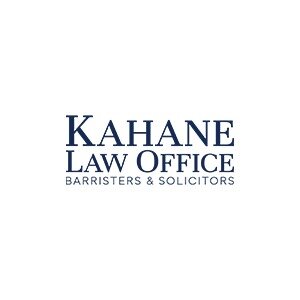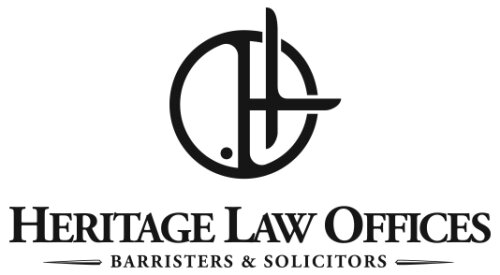Best Restructuring & Insolvency Lawyers in Edmonton
Share your needs with us, get contacted by law firms.
Free. Takes 2 min.
List of the best lawyers in Edmonton, Canada
About Restructuring & Insolvency Law in Edmonton, Canada
Restructuring and insolvency law in Edmonton deals with the legal processes and solutions available to financially distressed businesses and individuals. These laws help organizations and people address mounting debts, manage creditors, and, where possible, restructure their obligations to achieve financial stability. When restructuring is not viable, insolvency proceedings provide structured legal frameworks for winding down operations or personal affairs, while addressing creditor claims fairly and efficiently. In Edmonton, these processes are governed by Canadian federal legislation as well as certain provincial laws that outline the rights, obligations, and processes for debtors and creditors.
Why You May Need a Lawyer
Financial distress can affect anyone, from business owners facing reduced revenues and mounting debts to individuals unable to meet personal financial obligations. Common situations where you may need legal help in restructuring and insolvency include:
- Your business is unable to pay its debts as they come due
- Creditors are threatening legal action or have begun collection proceedings
- You are considering filing for personal bankruptcy or consumer proposal
- You want to explore restructuring to continue operations and protect assets
- You have received notice of bankruptcy, receivership, or foreclosure
- You are a creditor seeking to recover funds from an insolvent debtor
- You need advice on how to handle employee claims, leases, or contracts during restructuring
A lawyer experienced in restructuring and insolvency can assess your financial situation, explain your rights and obligations, help you select the most appropriate legal process, and advocate on your behalf throughout complex legal or court proceedings.
Local Laws Overview
Restructuring and insolvency in Edmonton, as part of Alberta and Canada at large, is governed by both federal and provincial regulations. Key federal statutes include:
- The Bankruptcy and Insolvency Act (BIA): Oversees bankruptcies, proposals to creditors, receiverships, and the general insolvency process.
- The Companies’ Creditors Arrangement Act (CCAA): Provides for larger restructurings of insolvent companies with debts over 5 million Canadian dollars.
Provincially, Alberta law impacts assets such as real estate and enforcement procedures for creditors, including the Civil Enforcement Act and related regulations. Local court systems, such as the Alberta Court of King’s Bench, often deal with bankruptcy and insolvency proceedings within Edmonton.
Laws restrict certain actions by creditors once insolvency proceedings are underway, and various forms of relief may be available to debtors (such as the automatic stay of proceedings). The law also sets out priorities for how funds are distributed among creditors, special protections for employees, and requirements for disclosure and reporting throughout the process.
Frequently Asked Questions
What is the difference between restructuring and insolvency?
Restructuring refers to processes that aim to reorganize debts and obligations so a business or individual can continue to operate and pay creditors over time. Insolvency usually refers to a legal state where debts cannot be paid as they become due, often leading to bankruptcy or receivership.
When should I seek legal advice for financial difficulties?
It is never too early to consult a lawyer if you feel overwhelmed by debt, are at risk of defaulting on payments, or have received legal notices from creditors. Early advice can create more options for resolving your financial issues.
What protections are available once insolvency proceedings begin?
When formal insolvency proceedings are started, most creditor enforcement actions (litigation, garnishments, repossessions) are automatically paused through what is called a stay of proceedings. This gives you breathing room to work out a solution.
What is a consumer proposal?
A consumer proposal is a legally binding offer to pay creditors a portion of what is owed, or to extend repayment over a longer period. This is available for individuals who owe less than 250,000 Canadian dollars (excluding a mortgage on their principal residence).
Does filing for bankruptcy mean losing everything?
No. Alberta law exempts certain assets from seizure in bankruptcy, such as basic household goods, personal items, a portion of personal equity in a home, and certain pensions and RRSPs.
How long does bankruptcy last in Alberta?
For a first-time bankrupt with no surplus income, bankruptcy can be discharged in as little as nine months. The timeline can be longer for repeat bankruptcies or where surplus income exists.
Can businesses restructure without filing for bankruptcy?
Yes. Businesses may negotiate informal arrangements with creditors or use legal tools such as proposals under the BIA or the Companies’ Creditors Arrangement Act, which allow for continued operations while restructuring debts.
What happens to employees during business insolvency?
Employees are given a preferred status in the distribution of funds, up to certain limits, for wages and vacation pay accrued before insolvency. Some may lose their jobs if the business closes or downsizes.
How do secured and unsecured creditors differ?
Secured creditors have collateral backing their loans and are paid first from the sale of secured assets. Unsecured creditors (such as credit card issuers) are paid after secured creditors and may receive less, depending on available assets.
Can I negotiate directly with creditors?
You can try to negotiate directly. However, legal and financial advisors can often achieve better outcomes, help you understand your rights, and ensure that any formal agreements are enforceable.
Additional Resources
If you are facing a restructuring or insolvency situation in Edmonton, the following resources may be helpful:
- Office of the Superintendent of Bankruptcy Canada - Provides information on bankruptcy, proposals, and licensed insolvency trustees.
- Alberta Courts - Information on local court processes and forms for bankruptcy and insolvency proceedings.
- Alberta Law Line - Offers general legal information and can refer you to resources for further help.
- Licensed Insolvency Trustees in Edmonton - Registered professionals who can administer proposals and bankruptcies.
- Edmonton Community Legal Centre - Provides free or low-cost legal advice to eligible individuals, including those dealing with financial difficulties.
Next Steps
If you are experiencing financial distress or are considering restructuring or insolvency, it is important to act quickly and seek professional advice. Here are steps to guide you:
- Assess your financial situation objectively, listing assets, liabilities, and sources of income.
- Speak to a restructuring and insolvency lawyer or a licensed insolvency trustee in Edmonton to understand your legal options.
- Gather relevant financial documentation such as financial statements, tax returns, loan agreements, and correspondence from creditors.
- Consider your goals: Is it to keep your business, avoid bankruptcy, or wind up affairs with as little impact as possible?
- Follow through on the advice provided, which may include formal legal proceedings or out-of-court settlements.
Early and informed action can make a significant difference in the available solutions and their outcomes. If you are unsure where to begin, contact a legal professional for a confidential consultation.
Lawzana helps you find the best lawyers and law firms in Edmonton through a curated and pre-screened list of qualified legal professionals. Our platform offers rankings and detailed profiles of attorneys and law firms, allowing you to compare based on practice areas, including Restructuring & Insolvency, experience, and client feedback.
Each profile includes a description of the firm's areas of practice, client reviews, team members and partners, year of establishment, spoken languages, office locations, contact information, social media presence, and any published articles or resources. Most firms on our platform speak English and are experienced in both local and international legal matters.
Get a quote from top-rated law firms in Edmonton, Canada — quickly, securely, and without unnecessary hassle.
Disclaimer:
The information provided on this page is for general informational purposes only and does not constitute legal advice. While we strive to ensure the accuracy and relevance of the content, legal information may change over time, and interpretations of the law can vary. You should always consult with a qualified legal professional for advice specific to your situation.
We disclaim all liability for actions taken or not taken based on the content of this page. If you believe any information is incorrect or outdated, please contact us, and we will review and update it where appropriate.











